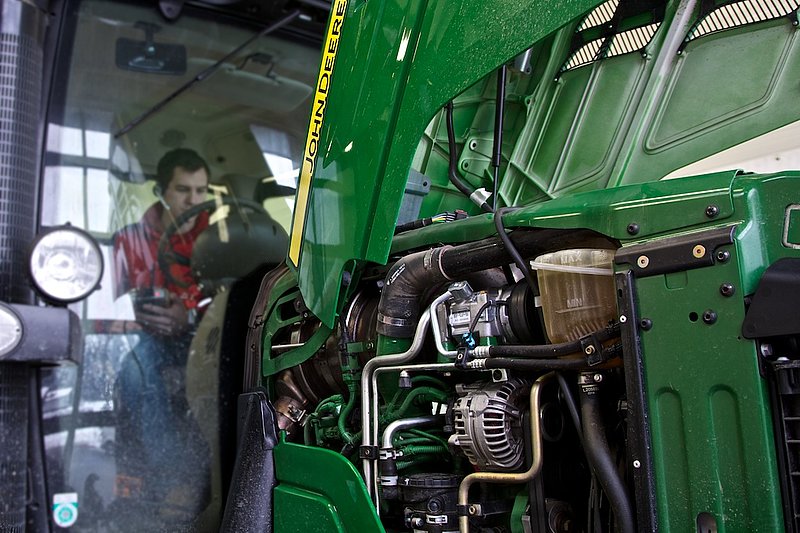Diesel Exhaust Fluid (DEF) is a critical component in the operation of John Deere diesel engines that are equipped with Selective Catalytic Reduction (SCR) technology. DEF is used to reduce emissions of nitrogen oxides (NOx) from the engine’s exhaust. However, DEF can cause problems if not handled or stored properly, or if the DEF dosing system is not functioning correctly. In this article, we will take a look at some common DEF problems that can occur with John Deere diesel engines and provide solutions to help you keep your engine running smoothly.
John Deere Def Problems and Solutions
- DEF contamination: DEF can become contaminated if it is exposed to water, debris, or other contaminants. This can cause problems with the DEF dosing system and can lead to reduced engine performance and increased emissions.
- Solution: To prevent DEF contamination, make sure to store DEF in a clean and dry place, away from any potential sources of contamination. Use a clean container to transfer DEF to the tractor’s DEF tank and make sure that the DEF tank is clean and free of debris. If DEF is already contaminated, it should be drained and replaced with new, clean DEF.
- DEF freezing: DEF is a urea-based fluid that can freeze at temperatures below 12°F (-11°C). Frozen DEF can cause problems with the DEF dosing system and can lead to reduced engine performance and increased emissions.
- Solution: To prevent DEF freezing, make sure to store DEF in a warm and insulated place, away from any potential sources of cold. If DEF has already frozen, it should be thawed out before use. It’s recommended to always check the DEF level before starting the engine and fill it if necessary.
- DEF dosing system failure: DEF dosing system failure can occur if the system is not properly maintained or if there is a problem with the dosing valve, injector, or sensor. This can cause problems with the DEF dosing system and can lead to reduced engine performance and increased emissions.
- Solution: To prevent DEF dosing system failure, make sure to follow the manufacturer’s recommended maintenance schedule for the DEF dosing system. This includes regular inspections of the dosing valve, injector, and sensor for wear or damage. Additionally, check the DEF dosing system for leaks or blockages and make sure that the DEF dosing system is properly calibrated. If the DEF dosing system is already failed, it is recommended to consult the operator’s manual or professional for further assistance.
- DEF level sensor failure: DEF level sensor failure can occur if the sensor is not properly maintained or if there is a problem with the sensor or the wiring. This can cause problems with the DEF dosing system, and can lead to reduced engine performance and increased emissions.
- Solution: To prevent DEF level sensor failure, make sure to follow the manufacturer’s recommended maintenance schedule for the DEF level sensor. This includes regular inspections of the sensor and the wiring for wear or damage. Additionally, check the sensor for proper calibration and make sure that the sensor is clean and free of debris. If the DEF level sensor is already failed, it is recommended to consult the operator’s manual or professional for further assistance.
- DEF quality: DEF must meet the ISO 22241-1 specification for quality and purity. DEF that does not meet this specification can cause problems with the DEF dosing system and can lead to reduced engine performance and increased emissions.
- Solution: To prevent DEF quality issues, make sure to use DEF that meets the ISO 22241-1 specification and is certified by the American Petroleum Institute (API) or other equivalent organizations. Avoid using DEF that is expired or has been stored for a long period of time. If the DEF quality is already in question, it is recommended to consult the operator’s manual or professional for further assistance.
Stupid DEF Emission problems & John Deere chopper break down quick fix!
Do John Deere Tractors Use Def?
John Deere tractors are some of the most popular and well-known tractors on the market. But do they use DEF?
The answer is yes, John Deere tractors do use DEF.
DEF is a diesel exhaust fluid that helps to reduce emissions from diesel engines. It’s used in a wide variety of applications, including passenger cars, trucks, buses, construction equipment, and agricultural equipment like John Deere tractors.
DEF is injected into the exhaust stream of a diesel engine where it reacts with NOx emissions to create harmless nitrogen gas and water vapor.
This reduces the amount of harmful emissions that are released into the atmosphere.
Using DEF can also improve fuel economy by up to 5%, which helps save money on operating costs. And since it’s such an important part of reducing emissions, using DEF can help farmers meet government regulations for air quality.
If you’re looking for a tractor that uses DEF to help reduce emissions and improve fuel economy, then a John Deere tractor is a great option.
What Year Did Tractors Start Using Def?
The use of DEF in tractors started in 2008. However, some manufacturers started using it as early as 2006 in their engines.
What Year Did John Deere Use Def?
John Deere began using DEF (diesel exhaust fluid) in its equipment in 2008. The company was an early adopter of the technology, which helps to reduce emissions from diesel engines. DEF is a clear, colorless liquid that is added to diesel fuel to create a cleaner-burning engine.
It works by breaking down nitrogen oxide (NOx) emissions into nitrogen and water vapor.
DEF is typically used in a 2% solution with diesel fuel. This means that for every 100 gallons (380 liters) of diesel fuel, two gallons (7.6 liters) of DEF are added.
The resulting mixture helps to significantly reduce NOx emissions from the engine, making it more environmentally friendly.
John Deere offers DEF as an option on all of its new equipment models. Customers can purchase it directly from John Deere dealerships or online through the John Deere website.

Credit: allcartuning.com
Def Pump Failure Symptoms
If you notice any of the following symptoms in your home, it could be a sign of a def pump failure:
1. Your furnace or boiler is having trouble staying lit. This is usually due to a lack of pressure in the fuel line, which can be caused by a failed def pump.
2. You have to constantly reset your thermostat. This is another symptom of low pressure in the fuel line, and can also indicate a problem with your def pump.
3. Your furnace or boiler is making strange noises.
These could be anything from banging or clicking sounds to hissing or whistling sounds. Any noise that’s out of the ordinary could be cause for concern and should be investigated by a professional.
4. You’re not getting enough heat from your furnace or boiler, even though it seems to be working properly otherwise.
This could mean that there’s something blocking the flow of fuel to the burner, which could again be caused by a failed def pump.
5 .Your utility bills have increased suddenly and significantly, even though your energy usage hasn’t changed much.
This could mean that your furnace or boiler is working harder than usual because it’s not receiving enough fuel, thanks to that pesky failed def pump again!
Conclusion
In conclusion, DEF is a critical component in the operation of John Deere diesel engines that are equipped with SCR technology. DEF problems can occur if the DEF is not handled or stored properly, or if the DEF dosing system is not functioning correctly. By following the manufacturer’s recommended maintenance schedule, using high-quality DEF, and addressing problems as soon as they arise, you can keep your John Deere diesel engine running smoothly and avoid costly repairs. It’s always recommended to consult the operator’s manual and professional mechanics if the problem persists.
